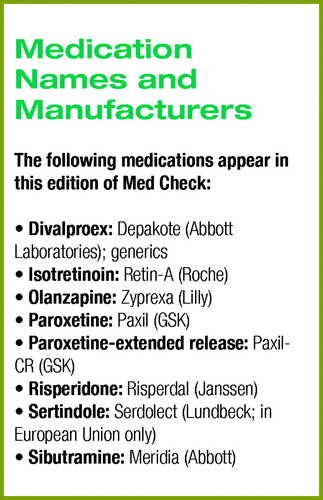Med Check
Regulatory and Legal Briefs
Paroxetine–extended release may be back on pharmacy shelves as early as next month. The Food and Drug Administration (FDA) and GlaxoSmithKline (GSK) have signed a consent decree outlining how the company will correct long-standing manufacturing deficiencies at a Puerto Rico facility. Those deficiencies led to the agency's seizure of all available stock of the company's Paxil-CR and a diabetes drug earlier this year. In March, FDA officials said Paxil-CR tablets had a significant risk of splitting, resulting in half of a tablet with no active medication, and the other half having only inert buffering ingredients. The decree required GSK to post a $650-million bond guaranteeing that the company would either successfully recondition the defective tablets or destroy them, as well as reimburse the government for enforcement costs relating to the seizure. | |||||
Sertindole will be allowed to return to the European market, the European Union's Committee for Medicinal Products for Human Use has announced. The second-generation antipsychotic was removed from the market in December 1998 because of reports of cardiac arrhythmias and sudden death associated with its use. The drug, chemically unique from other available antipsychotics, has never won approval in the United States because of its documented potential for increasing the heart's QTc interval, which increases patients' risk for ventricular arrhythmias. The drug is expected to be back on European pharmacy shelves later this year. | |||||
Research Briefs
Divalproex may be effective in treating depression and anxiety symptoms in patients with bipolar disorder, type I, according to a small pilot study. The drug's efficacy in treating these disorders was tested in an eight-week, double-blind, placebo-controlled trial involving 25 outpatients. Divalproex was significantly better at improving patient scores on the 17-item Hamilton Rating Scale for Depression (primary outcome), as well as the Hamilton Anxiety Rating Scale, the Clinician-Administered Rating Scale for Mania, and the Clinical Global Impression Scale (secondary outcomes). Although the sample size was small, the differences between divalproex and placebo on both depression and anxiety measures were highly significant. J Affect Disorders 2005; 85:259-266 | |||||
Isotretinoin prescribed for the treatment of moderate to severe acne in adolescents does not appear to increase symptoms of depression. On the contrary, scores of 101 patients who completed at least three months of isotretinoin therapy improved on the Center for Epidemiological Studies Depression Scale (CES-D). CES-D scores indicative of clinically significant depression were not statistically different between patients on isotretinoin and patients on conservative acne therapy, including systemic antibiotics and topical preparations. Similarly, the new onset of depressive symptoms was not significantly different between the two groups, and overall, depression scores improved in both groups. Arch Dermatol 2005; 141:557-560 | |||||
Risperidone is effective at reducing repetitive, restricted, and stereotyped patterns of behavior, interests, and activities in children with autism but is not associated with significant improvement in autistic children's deficits in social interaction and communication. Researchers combined an eight-week, double-blind, placebo-controlled phase (101 patients) with a 16-week, open-label, extension phase (63 patients) to determine the second-generation antipsychotic's effects on sensory-motor behaviors, affectual reactions, sensory responses, social relatedness, and language scores on the Ritvo-Freeman Real Life Rating Scale and on the children's scores on the Children's Yale-Brown Obsessive Compulsive Scale. Treatment effects were maintained for six months. Am J Psychiatry 2005; 162:1142-1148 | |||||
Sibutramine, an appetite suppressant, when given along with olanzapine, is associated with significantly greater decreases in mean weight compared with placebo after 12 weeks. Patients taking the combination of olanzapine and sibutramine also saw significant reductions in waist circumference, body mass index, and hemoglobin A1c compared with those taking olanzapine plus placebo. The side effects experienced by both groups were similar; however, subjects taking sibutramine experienced a mean increase of 2.1 mm Hg in systolic blood pressure. Anticholinergic side effects and sleep disturbances were at least twice as common in those taking sibutramine as in those taking placebo. | |||||
Am J Psychiatry 2005; 162:954-962▪




